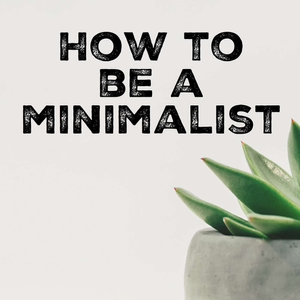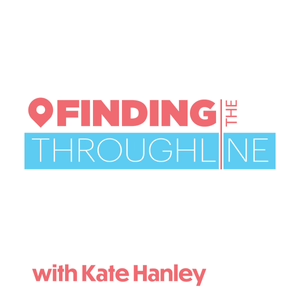
The Right Way to Network In Hollywood | with Chris Visser
10/05/17 • 71 min
“How can I break into Hollywood or advance in my creative career if I don’t know anybody?” is a common question I receive via e-mail, when I speak at events, or when I teach at USC or online. Whenever someone sends me an email or Facebook message and asks, “Can I buy you coffee and pick your brain?” this is inevitably their reason for reaching out.
Unlike doctors or lawyers, the path to being a successful film editor, writer, visual effects artist, animator, actor, or any other creative career is not a linear path, but here’s the secret nobody tells you: There are very specific steps you can follow to be successful, but you have to be willing to put in the time and take action consistently. The key is not discovering the path and following it, the key is learning the proper steps to forge your own unique path.
In this episode I dive deep into the topic of networking and what it looks like to do it right. My guest today is my assistant editor Chris Visser whom I met at a networking event a little over two years ago, and since then he has said all the right things and taken all the right steps to slowly build a relationship with me over time. And when the time was right he got “lucky” and ended up becoming a part of my team. But if you know me at all, you know I don’t believe in luck and think it’s simply when hard work intersects with opportunity.
If you’ve ever thought to yourself “It’s all about who you know, and I don’t know anybody, so I just give up!” then this episode is great place to start because Chris and I break down the key steps to networking the right way so you don’t waste your time and end up walking in circles wishing you just magically knew people. It’s time to get out there and build your network.
When you’re done listening to this episode, if you haven’t already I highly recommend checking out episode eleven, my two hour marathon interview with Norman Hollyn, former head of the editing track at USC.
Want to Hear More Episodes Like This One?
» Click here to subscribe and never miss another episode
Here's What You'll Learn:
- How Chris made it to Hollywood
- Eliminating excuses and finding your own path to success
- How to make an impression at your industry internship
- Processing and evaluating big career risks
- How a brat and cheese gift basket got Chris a job in Hollywood
- Building a post-studio from the ground up
- When Chris met Zack at EditFest LA
- Asking the right questions to the people that matter
- How to network without embracing the "sycophant rush"
- Knowing the mindset of the people you approach
- Breaking your career goals down into bite-sized action steps
- Chris' involvement with Blue Collar Post Collective (BCPC)
Useful Resources Mentioned:
Our Generous Sponsors:
This episode is made possible by Ergodriven, the makers of the Topo Mat, my #1 recommendation for anyone interested in moving more at their height-adjustable workstation. Listen, standing desks are only great if you’re standing well, otherwise you’re constantly fighting fatigue and chronic pain. Not like any other anti-fatigue mat, the Topo is scientifically proven to help you move more throughout the day which helps reduce discomfort and also increase your focus and productivity. And they’re really fun and a great conversation starter.
Guest Bio:Facebook|Twitter
Born and raised in the land of Beer and Brats (aka Wisconsin), Chris has loved the craft of filmmaking since taking a movie-making class his freshman year of high school. While attending Marquette University, Chris was lucky enough to earn the 2011 Post-Production Internship with the Emmys Foundation. He graduated in May 2012, and moved to Los Angeles just weeks after to pursue a career in the film industry.
His first few years were spent as an assistant editor at several post houses before becoming an online editor/colorist in January of 2015. After a year and a half of online-ing shows like Nellyville (BET) and Greatest Party Story Ever (MTV)...
“How can I break into Hollywood or advance in my creative career if I don’t know anybody?” is a common question I receive via e-mail, when I speak at events, or when I teach at USC or online. Whenever someone sends me an email or Facebook message and asks, “Can I buy you coffee and pick your brain?” this is inevitably their reason for reaching out.
Unlike doctors or lawyers, the path to being a successful film editor, writer, visual effects artist, animator, actor, or any other creative career is not a linear path, but here’s the secret nobody tells you: There are very specific steps you can follow to be successful, but you have to be willing to put in the time and take action consistently. The key is not discovering the path and following it, the key is learning the proper steps to forge your own unique path.
In this episode I dive deep into the topic of networking and what it looks like to do it right. My guest today is my assistant editor Chris Visser whom I met at a networking event a little over two years ago, and since then he has said all the right things and taken all the right steps to slowly build a relationship with me over time. And when the time was right he got “lucky” and ended up becoming a part of my team. But if you know me at all, you know I don’t believe in luck and think it’s simply when hard work intersects with opportunity.
If you’ve ever thought to yourself “It’s all about who you know, and I don’t know anybody, so I just give up!” then this episode is great place to start because Chris and I break down the key steps to networking the right way so you don’t waste your time and end up walking in circles wishing you just magically knew people. It’s time to get out there and build your network.
When you’re done listening to this episode, if you haven’t already I highly recommend checking out episode eleven, my two hour marathon interview with Norman Hollyn, former head of the editing track at USC.
Want to Hear More Episodes Like This One?
» Click here to subscribe and never miss another episode
Here's What You'll Learn:
- How Chris made it to Hollywood
- Eliminating excuses and finding your own path to success
- How to make an impression at your industry internship
- Processing and evaluating big career risks
- How a brat and cheese gift basket got Chris a job in Hollywood
- Building a post-studio from the ground up
- When Chris met Zack at EditFest LA
- Asking the right questions to the people that matter
- How to network without embracing the "sycophant rush"
- Knowing the mindset of the people you approach
- Breaking your career goals down into bite-sized action steps
- Chris' involvement with Blue Collar Post Collective (BCPC)
Useful Resources Mentioned:
Our Generous Sponsors:
This episode is made possible by Ergodriven, the makers of the Topo Mat, my #1 recommendation for anyone interested in moving more at their height-adjustable workstation. Listen, standing desks are only great if you’re standing well, otherwise you’re constantly fighting fatigue and chronic pain. Not like any other anti-fatigue mat, the Topo is scientifically proven to help you move more throughout the day which helps reduce discomfort and also increase your focus and productivity. And they’re really fun and a great conversation starter.
Guest Bio:Facebook|Twitter
Born and raised in the land of Beer and Brats (aka Wisconsin), Chris has loved the craft of filmmaking since taking a movie-making class his freshman year of high school. While attending Marquette University, Chris was lucky enough to earn the 2011 Post-Production Internship with the Emmys Foundation. He graduated in May 2012, and moved to Los Angeles just weeks after to pursue a career in the film industry.
His first few years were spent as an assistant editor at several post houses before becoming an online editor/colorist in January of 2015. After a year and a half of online-ing shows like Nellyville (BET) and Greatest Party Story Ever (MTV)...
Previous Episode

Making It In Hollywood as a "Creative" (What They Don't Teach You In Film School) | with Norman Hollyn
Author’s Note: ‘Tragedy’ doesn’t even begin to describe what it means for our industry to lose Norman Hollyn at the ridiculously young age of 66. He was quite possibly the kindest soul in Hollywood.
I’m asked so often by so many, “What’s the secret to really making it in Hollywood?” And the answer is SO simple: Provide value to others.
Norman proved through his actions, his never-ending kindness, and his generosity that the road to success is paved by simply providing value to others. It’s really that simple. He was a mentor and a friend who will be sorely missed.
The following is an in-depth interview I did with Norman when this program first began that is an absolute manifesto on what it really takes to build a fulfilling career in Hollywood. It has been listened to thousands of times on six continents, and of all my episodes it has received more positive feedback than any other...by far.
Rest In Peace Norman. Know that you left this world making a true impact on the lives of countless people, and your work will continue to make an impact for generations to come.
I will never be able to “lean forward” again without thinking of you.
Be well my friend.
Zack Arnold
---
“How can I break into Hollywood or advance in my creative career if there is no set path to follow?” is by far the most common question I receive via e-mail, when I speak at events, or when I teach at USC or online. Whenever someone sends me an email or Facebook message and asks, “Can I buy you coffee and pick your brain?” this is inevitably the big question they seek the answer to. Unlike doctors or lawyers, the path to being a successful film editor, writer, visual effects artist, animator, actor, or any other creative career is not a linear path, but here’s the secret nobody tells you: There are very specific steps you can follow to be successful, but you have to be willing to put in the time and take action consistently. The key is not discovering the path and following it, the key is learning the proper steps to forge your own unique path.
In this episode I dive deep into what it really takes to break into or advance in the Hollywood post-production industry with none other than USC professor and former head of the editing track, Norman Hollyn. This is a two hour marathon episode so get comfortable. This was one of the most downloaded and shared 2-part episodes of my former podcast, but I thought it beneficial to combined it into a single episode and feature it as part of the Optimize Yourself program so new people just discovering this show wouldn’t have to dig for it because people have told me firsthand this interview was the difference between them landing a job or not landing it. The advice Norman gives is seriously that universal and that powerful, and it can be applied far beyond jobs in post-production.
Want to Hear More Episodes Like This One?
» Click here to subscribe and never miss another episode
Here's What You'll Learn:
- Develop your skill set and then build your network of people
- Consider looking for work and networking your full time job
- Use online resources, industry magazines, etc
- How to use Facebook and Twitter to help you make connections
- Put yourself out there and make yourself valuable to people
- Make sure you continue to hone your craft and advance your skill set
- Find out what you don’t know and get good feedback!
- Should you take free work?
- People skills and social skills are more important than you think
- Part of advancing in your career is being able to make choices
- Re-evaluating your goals is growth
- Being fiscally responsible will give you more choices and give you the freedom to take work that’s valuable to your career and not necessarily your bank account
- To be happy it’s important to acknowledge that third circle: Personal needs
- Write down your intentions and focus -- no matter how many drafts it takes!
Useful Resources Mentioned:
A Classic Case of Post-Production Burnout
Our Generous Sponsors:
This episode is made possible by Ergodriven, the makers of the Topo Mat, my #1 recommendation for anyone interested in m...
Next Episode

The True Meaning of 'Below the Line' and How It Affects Your Career | with Mike J. Nichols
For those who work in the filmmaking industry, ‘Below the Line’ is a pretty common term, but in case you’re not familiar with it, it originated as an accounting term to separate the fixed costs of a film’s budget (actors, director, writers, and producers, etc) from the variable hourly, daily, and weekly costs of those working in various crafts such as editing, costumes, or the art department, just to name a few examples. Unfortunately ‘Below the Line’ has become much more of a social status symbol rather than just a simple accounting term.
Today’s interview is one of my favorites from way back in the ‘Fitness In Post’ archives where I had an in-depth chat with editor Mike J. Nichols, otherwise known as the ‘Edit Doctor’ about an article he wrote titled “Is the Term Below the Line Hitting Below the Belt?” In this very candid conversation we talk about the rampant idea that creative workers, film editors like myself being the perfect example, have simply become an extension of our workstations and how this affects the way we are treated by others, as well as our emotional involvement in our work. We also talk about what we need to do collectively to start standing up for ourselves.
If you feel as if you’re being treated like a pair of hands chained to your desk and you want to know what you can do about it, this episode provides plenty of action steps.
Want to Hear More Episodes Like This One?
» Click here to subscribe and never miss another episode
Here's What You'll Learn:
- The rampant idea that we are a pair of hands chained to our desks
- Mike’s first encounter with the phrase “below the line”
- What is “below the line”?
- How the term went from an accounting term to a status term
- On getting emotionally involved in a project you have a limited say in
- On how the “below the line” status is felt differently in each subset of editing
- The feeling of your contributions being undervalued
- What do we do about this status term?
- Most people don't even know what editors do!
- Technology as a driving factor in our dwindling status as filmmakers
- The editor as the final writer -- especially in reality and documentary
- Where we can start with eliminating this “status” -- we need to stand up for ourselves and our health
- Search for the cause not just the symptoms
- We need to have a better perception of ourselves
Useful Resources Mentioned:
From Rehab to Ultra Marathon with Wes Plate
Whiteboard Discussion - Avid Editors of Facebook Group
Whiteboard Discussion - Post Chat
Our Generous Sponsors:
This episode is made possible by Ergodriven, the makers of the Topo Mat, my #1 recommendation for anyone interested in moving more at their height-adjustable workstation. Listen, standing desks are only great if you’re standing well, otherwise you’re constantly fighting fatigue and chronic pain. Not like any other anti-fatigue mat, the Topo is scientifically proven to help you move more throughout the day which helps reduce discomfort and also increase your focus and productivity. And they’re really fun and a great conversation starter.
Guest Bio:Facebook|Twitter
Mike J. Nichols – “A rare combination of artistry and technology – A young Walter Murch” – actor/director Larry Holden.
As a teenager living in Ohio, Mike’s super-8 films garnered the attention of Frank Zappa’s son, Dweezil, who commissioned him for projects including work on a CBS network television series called, “Normal Life”. With the Zappa’s encouragement, Mike pursued film studies at Columbia College of Chicago winning two back to back short film first place awards which had never happened in the school’s student history.
In Los Angles, Mike edited the award winning indie film, My Father’s House (directed by Larry Holden) which featured Cameron Diaz and Josh Charles. Martin Scorsese praised, “My Father’s House”, as one of his favorite independent films ...
If you like this episode you’ll love
Episode Comments
Featured in these lists
Generate a badge
Get a badge for your website that links back to this episode
<a href="https://goodpods.com/podcasts/the-zack-arnold-podcast-80416/the-right-way-to-network-in-hollywood-with-chris-visser-4301522"> <img src="https://storage.googleapis.com/goodpods-images-bucket/badges/generic-badge-1.svg" alt="listen to the right way to network in hollywood | with chris visser on goodpods" style="width: 225px" /> </a>
Copy





